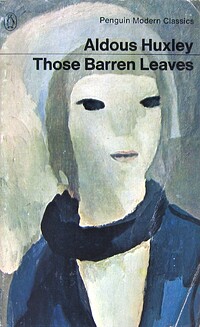Status
Available
Call number
Genres
Collection
Publication
Penguin (1972), Edition: New Ed, Paperback, 320 pages
Description
Fiction. Literature. HTML: It's no satireâ??Duke Classics has a fresh release of Aldous Huxley's Those Barren Leaves. Set in Italyâ??minus the cultureâ??Huxley's story mocks those who see themselves as the cultural elite, but who are actually little more than pretentious poseurs. The reader is merely an observer in the conversation of characters who seek to find importance and meaning in their li
User reviews
LibraryThing member skizelo
Another of Huxley's early novels where he puts the boot into his friends. Like Antic Hey and Chrome Yellow it's another perpetual house-party thrown by a ghastly woman who collects artists like butterflies. You would think Lillian Aldwinkle, a smudge of a woman who you would think had to be a
Show More
composite or pure invention, but was apparently a recognizable satire of Lady Ottoline Morrell. It's a bit broken-backed novel. There are false-starts, and it changes between satire and po-faced philosophy without much success. It ends on a ten page discourse on the nature of reality which I can't imagine anyone being excited to read. It's pretty interesting to see the tension within Huxley made so obvious, but it's a pretty big failing in the book itself. Show Less
LibraryThing member TakeItOrLeaveIt
not Huxley's best by any means but a telling story of upper-class dillatanttes and those who try to find something beyond. A sentimentalist adds incredible perspective to an otherwise dull story, however I must say the last chapter is possibly Huxley's most prolific writing and is a metaphor for
Show More
everything he ended up saying in not-so-metaphorical ways later in his life. Show Less
LibraryThing member michaelm42071
“An Evening at Mrs. Aldwinkle’s” introduces the art-worshipping, aging Lillian Aldwinkle, whose household at the Palazzo Cybo Malaspina in Vezzia includes her adoring niece Irene. The houseguests are the Guild Socialist Mr. Falx, young Lord Hovenden, who is a kind of acolyte of Falx and also
The second section, “Fragments from the Autobiography of Francis Chelifer,” contains the first-person description of Chelifer’s longtime infatuation and short love affair with Barbara Walters, a nymphomaniac—he says “a woman with a temperament, as the euphemists qualify the lascivious thing”—and who is a stupid, unimaginative, and mendacious but beautiful woman. After a near-drowning, Chelifer is taken up by Lillian Aldwinkle, who attempts to seduce him, but he resists. He is a writer who often compares his own writing to the checkerlike board game, halma: “Arts for art’s sake—halma for halma’s sake.” He is thus the opposite of Mrs. Aldwinkle, for whom art is all, but who is hardly able to appreciate it.
Cardan stumbles into a gothic household where a grasping brother hopes his moron sister, Grace Elver, will catch malaria and die, leaving him her money. Cardan takes Grace back to the palazzo, thinking that he can marry Grace, treat her well enough, and enjoy the interest on her fortune.
The house party moves to Rome, except for Calamy and Thriplow. Lord Hovenden and Irene become engaged, but as they move back toward Vezzia, Grace Elver insists on easting questionable fish, sickens, and dies. At the end Calamy leaves his affair with Mary Thriplow to go up into the hills to think.
Show More
in love with Irene, the novelist Mary Thriplow, who feigns simplicity (Diderot apparently said of the actors in the Commedia del Arte that the less they felt the better they represented feeling) to attract Mr. Calamy, and the cynic-raisonneur Mr. Cardan.The second section, “Fragments from the Autobiography of Francis Chelifer,” contains the first-person description of Chelifer’s longtime infatuation and short love affair with Barbara Walters, a nymphomaniac—he says “a woman with a temperament, as the euphemists qualify the lascivious thing”—and who is a stupid, unimaginative, and mendacious but beautiful woman. After a near-drowning, Chelifer is taken up by Lillian Aldwinkle, who attempts to seduce him, but he resists. He is a writer who often compares his own writing to the checkerlike board game, halma: “Arts for art’s sake—halma for halma’s sake.” He is thus the opposite of Mrs. Aldwinkle, for whom art is all, but who is hardly able to appreciate it.
Cardan stumbles into a gothic household where a grasping brother hopes his moron sister, Grace Elver, will catch malaria and die, leaving him her money. Cardan takes Grace back to the palazzo, thinking that he can marry Grace, treat her well enough, and enjoy the interest on her fortune.
The house party moves to Rome, except for Calamy and Thriplow. Lord Hovenden and Irene become engaged, but as they move back toward Vezzia, Grace Elver insists on easting questionable fish, sickens, and dies. At the end Calamy leaves his affair with Mary Thriplow to go up into the hills to think.
Show Less
LibraryThing member drsabs
Those Barren Leaves is Aldous Huxley’s third novel. Like Crome Yellow, it concerns a group of people gathered at the house of a society lady, and like both Crome Yellow and Antic Hay, has several eccentric characters. The location in an Italian villa, with forays to Mediterranean beaches and to
Show More
Rome, makes for a more exotic locale than the earlier novels. The dialogue among the characters addresses love, political and social mores and the meaning of life. As to be expected, he makes fun of the weaknesses of his principal characters, and it is difficult to tell to what extent any of them speaks for Huxley. However, the book’s dialogues do seem to take place at a higher level than in the earlier books as Huxley is, despite his cynicism, reaching for answers. Show Less
Subjects
Awards
Prix Langlois (1939)
Language
Original publication date
1925
Physical description
320 p.
ISBN
0140008322 / 9780140008326
